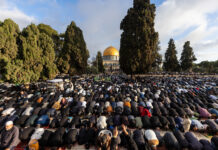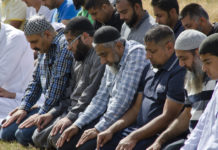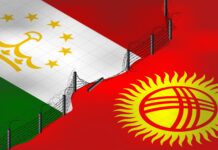Around 150 international scholars, politicians, social activists and journalists have called on the French Justice Minister to grant Professor Tariq Ramadan a speedy and fair trial.
The signatories say what is currently taking place is a “masquerade of justice” with biased judges ignoring crucial evidence and a judicial process which assumes Ramadan is guilty.
The prominent Swiss theologian has been indicted for the alleged rape of four women and has spent 10 months of the last two years in prison.
Ramadan insists all his relationships have been consensual. He is currently prohibited from leaving France and has to report to the police regularly while the judicial process continues.
Here is the statement in full:
This process has gone on far too long by French investigating judges, Camille Guillermet, Camille Palluel and Cyril Paquaux. Their bias, lack of impartiality, neglect of key evidence, delaying of key information and ignoring investigations brought forward by the French Criminal Division has been astonishing. In their role as “investigating judges”, it is surprising that they have chosen to ignore exculpatory evidence and suspicious connections between the plaintiffs and long-time critics of Professor Ramadan.
Let us be clear: We, the signatories of this letter, endorse France’s commitment to uphold the values of “liberté, égalité, fraternité” threatened today around the world. It is not for us to judge Tariq Ramadan’s guilt or innocence. We fully recognise the rights of the plaintiffs to have their case heard without prejudice. However, we wish to remind the country that has affirmed the inalienability of human rights and equality of the importance of respect for the principles that ensure the integrity of French justice.
Subscribe to our newsletter and stay updated on the latest news and updates from around the Muslim world!
It has been two years since professor Ramadan was indicted, nine months of which were spent in pre-trial solitary detention, despite the chief prison medical authority confirming his health was incompatible with incarceration due to illness. Professor Ramadan was also denied access to his case file and thus to the necessary means of preparing his defence. His right to a speedy judicial process has been ignored. Since his release in November 2018, the turn of events has been even more worrying. The following are a few examples:
– The judges mandated an expert psychiatrist, Dr Daniel Zagury, to see if there was a notion of “psychological grip” on the plaintiffs, an extremely rare procedure. The whole case depends now on his report. This is a clear conflict of interest as Dr. Zagury’s is an active member of the pro-Zionist Schibboleth association, which is ideologically opposed to Professor Ramadan. He also has friendly links with the opposing counsel Me Francis Szpiner and Me Eric Morain. We request that he recuse himself immediately.
– The fourth complainant, “Elvira” was completely invalidated by the Criminal Division. The judges and prosecutors continued to hear her complaint until she recanted and it was clearly determined she did not even know Tariq Ramadan. Elvira and Mounia Rabbouj have both publicly stated, on social media, that they have been pushed and manipulated by the Israeli French paparazzi Jean-Claude Elfassi. The Criminal Division discovered that the latter has actually been in touch with the four plaintiffs (he, himself, acknowledged on I24 TV channel he was in touch with the fifth complainant in Switzerland). Surprisingly, after 28 months of investigation, Jean-Claude Elfassi has not been heard by the investigating judges.
– The judges have indicted Tariq Ramadan on the basis of two witnesses whom they have not even questioned, and whom they encouraged to come forward (even though they did not file a complaint).
Has Professor Ramadan been granted the equal treatment so prized by France when high-ranking political figures, artists, and film producers accused of similar offenses have their rights protected like a gold standard? Is there one form of justice for Muslims in France and another for everyone else?
In short, we respectfully ask, has Professor Ramadan benefitted from a fair and equitable legal process, one in which he is presumed innocent until proven guilty?
We appeal to your commitment to France’s reputation as a defender of justice. We trust that as the Minister of Justice you will respond to our appeal and address our concerns that a fair and just process be implemented. In particular, we suggest that if the Magistrates in charge of Tariq Ramadan’s case are not able to properly do their work with the impartiality required by the Judiciary’s code of ethics, they should be removed and replaced by truly impartial judges.
John Esposito, University of Georgetown, USA
Tariq Modood, University of Bristol, UK
Kalypso Nikolaïdis, University of Oxford, UK
Cornel West, University of Harvard, USA
Ms Karen Amstrong, British author and commentator, UK
Charles Taylor, McGill University (Emeritus), Canada
Ilan Pappe, University of Exeter, UK
Ms Mairead Maquire, Peace Nobel Prize Winner, Northern Ireland
Stephen Chan, SOAS, University of London, UK
Richard Falk, Princeton and Queen Mary Universities, USA, UK.
Jørgen S. Nielsen, University of Copenhagen, Denmark
Khaled Abou el Fadl, UCLA, USA
George Joffé, University of Cambridge & London, UK
Talal Asad, The City University of New York, USA
Dr Aminata Dramane Traoré, former Minister of Culture, Mali
Charles E. Butterworth, Emeritus, University of Maryland, USA
Dr Chandra Muzaffar, Chair, JUST, Malaysia
Dr Anwar Ibrahim, former Deputy Prime Minister, Malaysia
Mohammad Hashim Kamali, Chair IAIS, Malaysia.
Bock-Yong Kim, President of Hanil University, Korea
Dr François Burgat, CNRS, France
Salman Sayyid, University of Leeds, UK
Mr Boubacar Boris Diop, writer, novelist, journalist, Senegal
Sonia Dayan-Herzbrun (Emeritus), Université de Paris, France
Sami Al-Arian, Istanbul Zaim University, Turkey
Osman Bakar, ISTAC-IIUM, Malaysia
Alassane Diedhiou, Vice-Rector, University Assane Seck, Senegal
Oumar Sy, University Assane Seck, Senegal
Sari Hanafi, American University of Beirut, Lebanon
Humayun Ansari, Royal Holloway, University of London, UK
Adil Salahi, Author and scholar, UK
Asma Afsaruddin, Indiana University Bloomington, USA
David Palumbo-Liu, Stanford University, USA
Geneviève Rail (Emeritus), University of Concordia, Canada
Khalil Elahee, University of Mauritius, Mauritius
Ermin Sinanovic, United States Naval Academy, USA
Jacques Neirynck, EPFL (Emeritus), Switzerland
Chiara Sebastiani, University of Bologne, Italy
Ray Jureidini, Hamad Bin Khalifa University, Qatar
Massimo Campanini, University of Trento & IUSS di Pavia, Italy
Paul Aarts, University of Amsterdam, The Netherlands.
Richard Francis Gombrich, University of Oxford, UK
Ulises Tamayo, Autonomous University of Tlaxcala, Mexico
Anwar Alam, Policy Perspectives Foundation, New Delhi, India.
Lord Professor Bhikhu Parekh, University of Westminster, UK
John Holmwood, University of Nottingham, UK
Fethi Mansouri, University of Deakin, Australia
Richard Friedli, University of Fribourg, Switzerland
Craig Calhoun, Arizona University, USA
Anna Triandafyllidou, Ryerson University, Canada
Shahram Akbarzadeh, Deaken University, Australia
Raphaël Confiant, writer, University of Antilles, France
Akeel Bilgrami, Columbia University, USA
John Keane, University of Sydney and WZB, Germany
Shad Saleem Faruqi, University of Malaya, Malaysia
Nader Hashemi, University of Denver, USA
Dr Marie-Lorraine Pradelles Monod, psychologue, France
Dr Jaspal Kaur Sadhu Singh, Help University, Malaysia
Dr Haitham al-Haddad, Chair of the fatwa committee, UK
Dr Aasim Padela, University of Chicago, USA
Dr Yvonne Haddad, Georgetown University, USA
Dr Dalia Mogahed, Director, Consultant, USA
Maximin Emagna, Président Europe Belgium Diversity, Belgium
Dr Eric Hazan, writer, founder and publisher “La Fabrique”, France
Dr Anas Altikriti, CEO Cordoba Foundation, UK
Dr Shazad Amin, CEO Mend, UK
Dr Manazir Ahsan, Chair, The Islamic Foundation, UK
Dr Fatiha Talahite, CNRS, France
Dr Raghad Altikriti, President, MAB, UK
Ellen van de Bovenkamp, Leiden, The Netherlands
Dr Murshid Davids, Director, South Africa
Dr Hatem Bazian, Director IRDB, University of California-Berkeley, USA
Dr Alain Gabon, Virginia Wesleyan University, USA
Dr Abdullah Faliq, London Metropolitan University, UK
Dr Sarah Marusek, University of Leeds, UK
Dr Farooq Murad, Islamic Foundation, UK
Dr Ismail Patel, Chair, Friends of Al-Aqsa, UK
Dr Fanny Bauer-Motti, psychologist, UK
Dr Ramon Grosfoguel, University of California-Berkeley, USA
Dr Haoua Sounna Mamadou, Vice-President AFMA, Niger
Dr Abderrahmane Lahlou, Consultant Education & Finance, Morocco
Dr Jaouad Iraqi, jurist, Morocco
Dr Arujunan Narayanan, HELP University, Malaysia
Dr Shabbir Akhtar, University of Oxford, UK
Dr Silvia Maeso, Centre for Social Studies, Portugal
Dr Pravini Baboeram, DNI, The Netherlands
Dr Alexander Fluegel, EPO, The Netherlands
Dr Quraysha Ismail Sooliman, University of Pretoria, South Africa
Dr Amanj Aziz, Nyans, Sweden
Mohamed Nour Dachan, President UCoII (Emeritus), Italy
Dr Massoud Shadjareh, Chair, Islamic Human Rights Commission, UK
Dr Belem Bassirou, Ministery of Environment, Burkina Faso
Dr Ahmad Farouk Musa, Monash University, Malaysia
Dr Aliou Baldé, University Assane Seck, Senegal
Dr Sehija Dedovic, Center for Education and Research-Nahla, Bosnia
Dr Ibrahima Ndiaye, economist (UvS), Senegal
Dr El Hadji Séga Gueye, lecturer, France
Dr Mohammad Abdur Rahman Siddiqi, Chairman (IMCJ), Japan
Dr Francois Deroche, medical doctor and President JDSF, France
Dr Homa Katouzian, University of Oxford, UK.
Dr Diadié Maiga, World Health Organization, Congo-Brazzaville
Dr Ahmed Ismail Manjra, paediatrician, South Africa
Dr Bilal Hassam, medical doctor, United Kingdom
Sante Ciccarello, Islamic Relief, Italy
Dr Mohammed Hashas, FSCIRE-La Pira Center, Italy
Dr Shaker Elsayed, Imam, USA
Dr Riccardo Mazzeo, writer, publisher, Italy
Dr Patrizia Dal Monte, theologian, Italy
Dr Paolo Gonzaga, writer, translator, Italy
Ms Yvonne Ridley, Journalist and author, Scotland
Mr Cheick Oumar Sissoko, film director and politician, Mali
Mr Jamal Elshayyal, Journalist and war correspondent, Qatar
Mr Sandew Hira, co-Director DIN, The Netherlands
Sharifah Nazneen Syed Agha, Human rights lawyer, Malaysia
Mr Ricardo Faty, professional footballer (soccer), France-Senegal
Mr Mohamed Diame, professional footballer (soccer), France-Senegal
Mr Doudou Jacques Faty, professional footballer (soccer), Senegal
Mr Ousmane Coulibaly, professional footballer (soccer), Mali
Ms Munisah T Yusoff, Academic consultant, Malaysia
Ms Adélita Genoud, independent journalist, Switzerland
Mr Mamadou Beloum, former Mayor of Seguenega, Burkina Faso
Mr Michael Gunga, Sales Director & Business Consultant, UK
Mr Azad Ali, Community Relations Director, CAGE, UK
Mr Moazzam Begg, Outreach Director, CAGE, UK
Mr Mouhad Reghif, Bruxelles Panthères, Belgium
Mr Tan Sri Jawhar Hassan, Chairman of ISIS, JUST, Malaysia
Ms Rosiah Jantan, JUST, teacher and writer, Malaysia
Ms Thevaki Sriseyohn, clinic psychologist, UK
Mr Hamza Roberto Piccardo, writer, publisher, Italy
Mr Kevin Allagapen, Global Service Analyst, UK
Mr Regis Joffre, Solutions Architect, UK
Ms Basma Elshayyal, University of Warwick, UK
Ms Houria Bouteldja, PIR, France
Mr Abdurrahim Boynukalin – Director, Turkish-British Association
Mr Ajmal Masroor, Director, Barefoot Inst & Freelance Broadcaster, UK
Ms Rakhia Ismail, Councillor, Mayor of Islington, UK
Mr Mohammed Kozbar, Chairman Finsbury Mosque, UK
Mr Jan Ritsema, Performing Arts Forum, France
Mr Giovanni Sarubbi, Director « Il Dialogo.org », Italy
Mr Davide Piccardo, Director, LaLuce.news, Italy
Ms Feïza Ben Mohamed, journalist, France
Mr Tengku Iskandar Tengku Adnan, Researcher, JUST, Malaysia






















